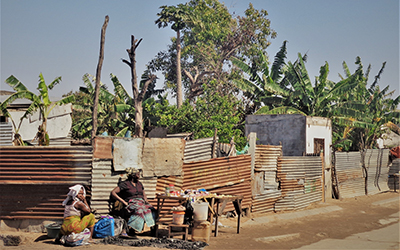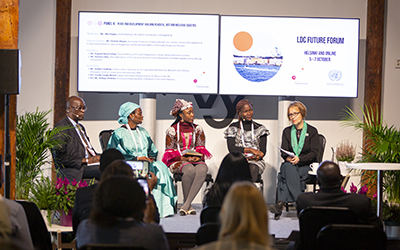How can research help Least Developed Countries achieve sustainable development?
The next decade is a make-or-break for the world’s most vulnerable countries. To tackle the unprecedented confluence of COVID-19, climate, and economic crises, new solutions are desperately needed. Scientific research is one key for finding long-lasting solutions.
Least developed countries (LDCs) are low-income countries that face severe structural impediments to sustainable development. These countries are highly vulnerable to economic and environmental shocks and have low levels of human assets. Most LDCs suffer simultaneously from multiple development challenges, ranging from socioeconomic and environmental ones, to those related to security and governance. This makes settling on a sustainable development path a particularly daunting task – one that is aggravated by the often dire lack of data and evidence on which a country could effectively plan its policies, and weak financial resources to produce new knowledge.
Mozambique – a country rich in both natural resources and problems

The above is the case for Mozambique — a country rich in natural resources yet with one of the highest poverty rates and lowest ratings in educational attainment. A country that is prone to climate change-induced extreme weather events, with an ongoing natural resources-related armed conflict, and a debt crisis. Data and evidence are scarce, even for Mozambique’s priority sectors, and most of it is produced within one-off donor-driven projects, leading to a lack of comparable data over time.
However, through a collaborative research programme implemented in 2015, gathering two Mozambican institutions — the Ministry of Economics and Finance, and the University Eduardo Mondlane —, UNU-WIDER and the University of Copenhagen, the Mozambique government has been able to gain access to new data, analyse policy-relevant evidence and adopt policies that benefit the poorest and most vulnerable groups.
One example of this partnership is the work done on poverty analysis, including the production of Mozambique’s National Poverty Assessments every five years. Thanks to our long-term collaboration, the poverty team at the ministry is now knowledgeable in this area, can explain and defend the methodology to other ministers and apply new data to ensure continuity.
Capacity-building is part of the research process
Several of our research collaboration programmes include capacity-building, which happens for instance through trainings, project workshops, seminars and conferences. But we know that true capacity development in research and analysis implies time and commitment. It requires sitting down together, jointly identifying and addressing needs, providing day-to-day mentoring, and offering opportunities to present and publish results. This is what our Research Fellows in the UNU-WIDER country programmes do on a daily basis. This is not a one-way process, quite the contrary: we believe that capacity development is only sustainable if it is based on collaboration.
In Mozambique, we have been privileged to support numerous young economists on their journey to becoming high-performing researchers and analysts. Many of them started as trainees and ended up with master’s degrees and/or pursuing careers in research and policy analysis in Mozambique.
In this context I think, in particular, of some of the programme trainees who grew from getting a bachelor’s in economics, to becoming young researchers, to today being called to present their research results in high-level ministerial meetings. I am also reminded of a technician at the Ministry of Economy and Finance of Mozambique who, with the support of the programme, recently finalised his master’s degree and is today leading the multisector end-user group of a microeconomic simulation model at the ministry.
How to achieve sustainable development in Tanzania?

Tanzania has been ranked 163rd out of the 189 countries on UNDP’s Human Development Index, remaining more or less in the same position from 1990 to 2019. Despite impressive economic developments and improvements in social policies in recent years, the country continues to face considerable development challenges, not least in essential areas such as economic distribution, population growth, corruption, and division between party and state. But like Mozambique and other LDCs, a dearth of data is one of the biggest challenges Tanzania faces.
Engaging local early career researchers is an important channel for capacity-building. This channel not only allows an LDC access to the best first-hand information on the most urgent research questions, but also ensures stronger ownership among people with high potential to bring about change. This is the idea behind UNU-WIDER’s research co-operation with Tanzania’s UONGOZI Institute. Through our jointly defined research agenda and collaboration, we were able to collect several new qualitative datasets on issues ranging from livelihoods to women’s safety in street vending businesses. The data have been used by the research community to provide different policy scenarios to decision makers.
Research collaboration holds great potential
We at UNU-WIDER believe that only when a country is the owner and co-creator of their knowledge and skills can sustainable change truly be attained. This, for us, is the key to achieving the United Nations Sustainable Development Goals (SDGs) in LDCs. LDCs need more data, results, communication, and knowledge-informed policies. Through research, potentially millions of people can benefit from better designed policies that bring about development and positive change.

On 5-7 October in Helsinki (and online), the LDC Future Forum brought together the academic community, policy makers, and practitioners to solicit new thinking on the challenges LDCs face and make policy recommendations for the next decade, ahead of the fifth LDC Conference (LDC5) in January 2022.
The conference introduced concrete recommendations to finance climate-friendly solutions in LDCs, make debt policies fairer, improve economic performance by closing gender gaps, and build peace in conflict prone LDCs. Improving LDCs’ productive capacity is also a top priority. The Future Forum provided a fresh reminder that the ultimate goal of academic research is not to publish in journals, but to make an impact and change the world.
The views expressed in this piece are those of the authors, and do not necessarily reflect the views of the Institute or the United Nations University, nor the programme/project donors.


